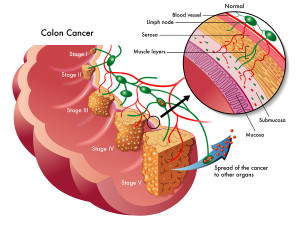Introduction
As with other cancers staging of colon cancer is important to establish exactly how widespread the tumor is prior to initiating therapy. Colon cancer survival rates depend on the stage of the tumor before therapy is begun. For many years the Duke classification has been used by surgeons throughout the world to compare the result of different treatment methods. The newer TNM classification is also available to refine this classification system, but this would be too complex to describe here.
Staging of colon cancer: Duke classification
According to the Duke classification there are four stages for rectal or colon cancer as shown below.
|
|||||||||||||||
|
Using the best possible treatments the colon cancer survival rates over 5-years, as indicated above, can be achieved. This information is taken from Ref. 1 and 2. Depending on the stage of the cancer treatment will differ.
References
1. Cancer: Principles &Practice of Oncology, 4th edition, by V.T. De Vita,Jr.,et. al J.B. LippincottCo.,Philadelphia, 1993.Vol1. Chapter on Cancer of the colon.
2. Cancer: Principles&Practice of Oncology. 5th edition, volume 1. Edited by Vincent T. DeVita, Jr. et al. Lippincott-Raven Publ., Philadelphia,PA, 1997. Chapter 32, Section 7: Cancer of the colon.
3. The Merck Manual, 7th edition, by M. H. Beers et al., Whitehouse Station, N.J., 1999. Chapter 34, page 328-330.
4. S Srivastava et al. Clin Cancer Res 2001 May;7(5):1118-1126.
5. RF Holcombe et al. Cancer Detect Prev 2001;25(2):183-191.
6. S Kinuya et al. J Nucl Med 2001 Apr;42(4):596-600.
7. D Chen et al. IEEE Trans Med Imaging 2000 Dec;19(12):1220-1226.
8. B. Sears: “The age-free zone”.Regan Books, Harper Collins, 2000.







